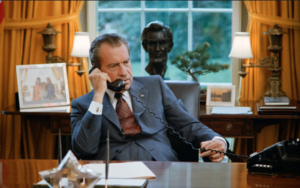WATERGATE: 4 ½ STARS. “carefully details a story we think we already know.”
 An epic new documentary from director Charles Ferguson takes four hours to carefully detail the events of a story many of us think we already know. Titled “Watergate: Or: How We Learned to Stop an Out-of-Control President,” it’s a detailed history lesson of ethical and moral violations that come with a cautionary message.
An epic new documentary from director Charles Ferguson takes four hours to carefully detail the events of a story many of us think we already know. Titled “Watergate: Or: How We Learned to Stop an Out-of-Control President,” it’s a detailed history lesson of ethical and moral violations that come with a cautionary message.
If the name Richard M. Nixon doesn’t immediately conjure up images of an uncomfortable looking man unconvincingly telling the American public, “I am not a crook,” or you haven’t seen “All the President’s Men,” or read the books or watched or any of the myriad documentaries on Watergate the bare bones: In 1972 five men with cameras and wiretap equipment broke into at the Democratic National Committee headquarters at the Watergate office complex in Washington, D.C.. They were quickly arrested (after being spotted by the night watch security guards) and the scandal, fueled by secretly recorded tapes from the White House, a botched cover-up, a cast of very colourful characters and a president with a loose respect for doing the right thing, touched the upper echelons of the American power structure. It’s a tale of hush money, bulging briefcases of evidence and obstruction of justice that lead to 41 people convictions and “Tricky Dick” Nixon becoming the first President in American history to resign on the night of August 8, 1974.
Watergate lived at the very center of political and pop culture, making front page news for months and dominating news reports. As such there is a great deal of documentation for Ferguson to cull. And cull he does, hours of 1970s news footage—mixed with new interviews and some re-enactments based on the infamous Watergate tapes—form the doc’s backbone. This rich tapestry of material painstakingly weaves together the story, what superstar reporter Bob Woodward (who, with Carl Bernstein broke the story) calls the five wars of Watergate, “the war against the anti-war movement, the news media, against justice, against the Democrats and then the war against history.
It is a long, complex story, presented in two parts with an intermission, ripe with historical nuance and detail but beyond the history lesson is the above-mentioned cautionary message. In politically provocative times the film reminds us of the old chestnut that history often repeats. Or, as House Judiciary Member James Mann says near the end of the film, “If there be no accountability another president will feel free to do as he chooses. But the next time may be no watchmen in the night.”
